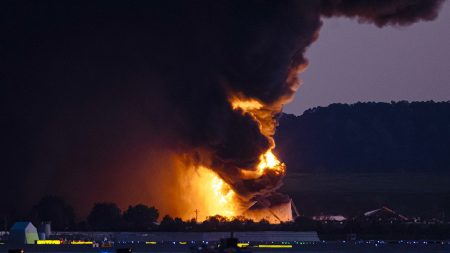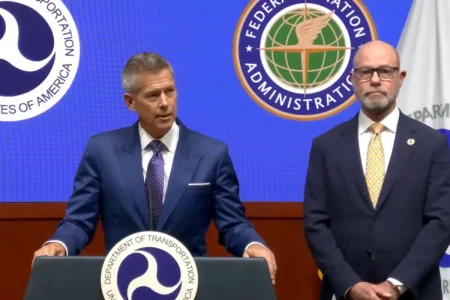Deadly Crash at UPS Worldport Hub Claims Nine Lives, Disrupts Global Shipping Operations
Tragedy Strikes at Critical Logistics Nexus
In a devastating incident that sent shockwaves through both the local community and global supply chain networks, nine individuals lost their lives yesterday in a catastrophic crash at UPS Worldport, the company’s flagship automated package sorting facility. The incident, which occurred during the early morning hours when the facility typically processes hundreds of thousands of packages, prompted an immediate cessation of operations at what industry experts describe as one of the most critical logistics hubs in North America. Emergency responders arrived at the scene within minutes, but were unable to save the victims, whose identities are being withheld pending notification of their families. “This is a dark day for our company and especially for the UPS family in Louisville,” said a visibly shaken UPS spokesperson during an impromptu press conference. The facility, which spans over 5.2 million square feet and employs approximately 11,000 workers, has never experienced a safety incident of this magnitude since its expansion and modernization in 2002.
Impact on Global Shipping Network Immediately Felt
The ripple effects of the Worldport shutdown were almost instantaneous across UPS’s integrated global network, with the company acknowledging that customers should anticipate delivery delays as officials work to reroute packages and redistribute workflow to alternative facilities. “We’re implementing our contingency protocols, but consumers and businesses should prepare for some disruption to expected delivery windows,” stated Maria Reynolds, UPS Vice President of Network Operations. The Louisville-based Worldport facility serves as the central nervous system of UPS’s international shipping infrastructure, processing an average of 2.3 million packages daily – a volume that increases substantially during peak seasons. Financial analysts are closely monitoring the situation, with early estimates suggesting the temporary closure could cost the company upwards of $25 million per day in operational inefficiencies and expedited alternative shipping arrangements. The incident comes at a particularly challenging time for the logistics industry, which has been working to normalize operations following years of pandemic-related disruptions and increased e-commerce demand.
Investigation Underway as Questions Mount About Safety Protocols
Federal transportation safety officials arrived on site by mid-afternoon to commence what is expected to be a comprehensive investigation into the circumstances surrounding the fatal crash. While details remain limited, preliminary reports suggest the incident involved a ground vehicle collision in one of the facility’s high-traffic loading areas, where automated sorting systems interface with human operators and drivers. “We’re committed to understanding exactly what happened and why,” said Thomas Bergman, lead investigator for the National Transportation Safety Board. “Our team will be examining everything from mechanical systems and maintenance records to training procedures and safety protocols.” The investigation comes amid growing industry-wide conversations about automation safety and the integration of increasingly sophisticated technology with human workers in fast-paced logistics environments. Labor representatives have called for a thorough evaluation of safety measures at similar facilities nationwide, while UPS has pledged full cooperation with investigators and promised an internal safety audit of all major sorting hubs.
Communities and Corporations Rally Around Victims’ Families
As news of the tragedy spread, both the Louisville community and the broader corporate world moved quickly to support those directly affected. UPS has established a dedicated crisis response team to assist the families of victims, offering counseling services, financial assistance, and logistical support during this difficult time. “Our first and most important focus is on the wellbeing of our team members and the families who have suffered unimaginable loss,” said UPS CEO Carol Tomé in a written statement released to the press. “The entire UPS family stands with them.” Several major corporations with significant shipping relationships with UPS, including Amazon, Apple, and Walmart, have issued statements of condolence and pledged patience as the logistics company works through the aftermath of the incident. Local blood banks reported an overwhelming response from Louisville residents wanting to help, while city officials have announced plans for a community vigil to honor those lost in the tragedy. The incident has highlighted the often-overlooked human element behind the complex logistics networks that power modern commerce.
Operational Challenges Test UPS’s Contingency Planning
The sudden closure of Worldport—often referred to as the “heart” of UPS’s global operations—has triggered what logistics experts describe as one of the most significant real-world tests of the company’s disaster recovery and business continuity plans. The facility, which underwent a $1 billion expansion in 2010, represents not just a sorting facility but a technological marvel that connects air, ground, and data networks to orchestrate deliveries across 220 countries and territories. “Worldport isn’t just another warehouse—it’s arguably the most sophisticated package processing facility on the planet,” explained Dr. Elaine Morrison, Professor of Supply Chain Management at MIT. “Redirecting that volume through other hubs requires extraordinary coordination.” UPS has activated regional sorting facilities in Dallas, Philadelphia, and Ontario, California to absorb some of the capacity, while also chartering additional aircraft to maintain international shipping commitments. Industry analysts note that the company’s response will likely become a case study in supply chain resilience and crisis management. The timing is particularly challenging as many retailers are already placing orders for upcoming seasonal inventory, creating additional pressure on an already strained system.
Looking Forward: Industry Implications and Path to Recovery
As the immediate shock of the tragedy begins to transition into forward-looking response efforts, both UPS and the broader logistics industry face critical questions about the future of automated facilities and workplace safety. The company has not yet provided a timeline for Worldport’s reopening, though experts suggest a phased approach is likely, with certain areas resuming operations before others depending on the investigation’s findings. “This incident will undoubtedly prompt a reevaluation of safety standards across similar facilities worldwide,” noted Samantha Winters, executive director of the International Association of Logistics Safety. “The lessons learned here will influence facility design and operations for years to come.” For consumers and businesses dependent on the reliable delivery infrastructure that has become increasingly vital in the digital economy, the incident serves as a sobering reminder of the complex human and mechanical systems that underpin modern commerce. UPS has assured customers that it is working around the clock to minimize disruptions while respecting the need for a thorough safety investigation. As one industry analyst observed, “In an era where we’ve come to expect packages at our doorstep within hours of clicking ‘buy,’ this tragedy reminds us of the human cost that can come with that expectation.” The company has announced plans for a memorial at the Worldport facility once operations resume, ensuring that even as packages begin flowing again, the lives lost will not be forgotten.









